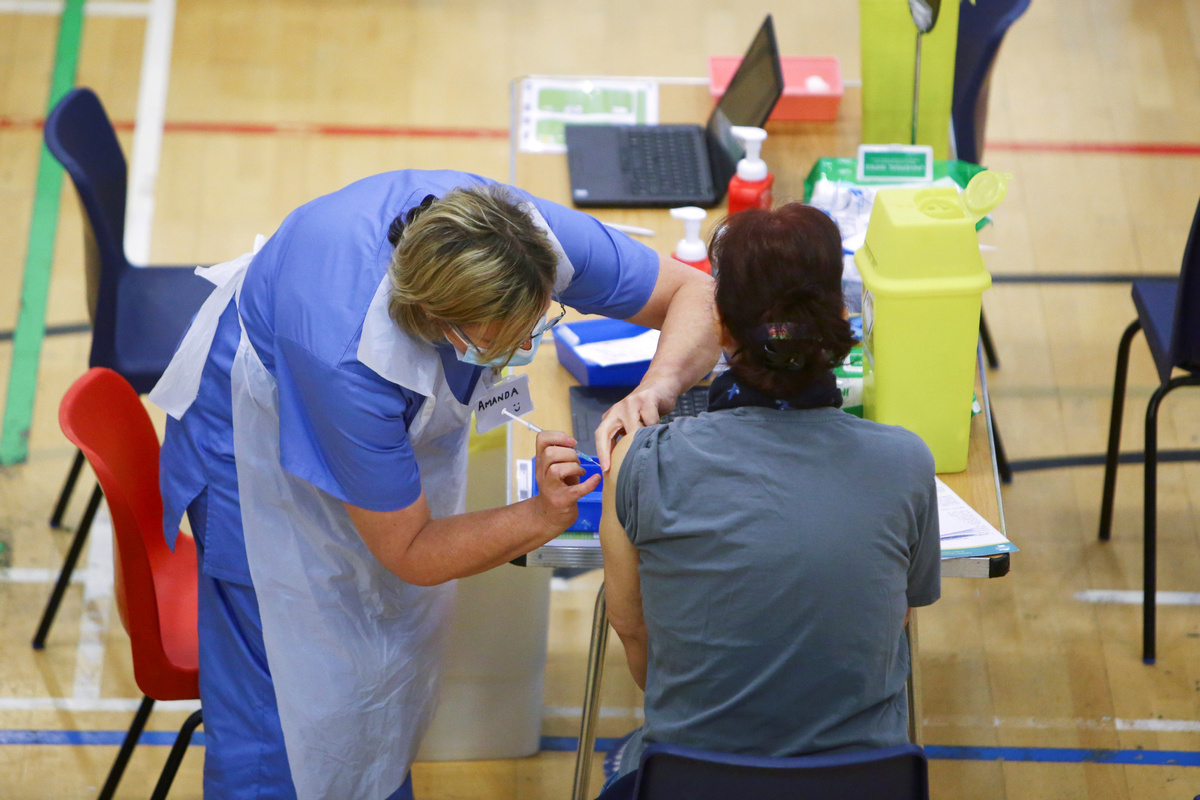'Lumps' to hit UK's vaccine rollout drive
By JULIAN SHEA in London | China Daily Global | Updated: 2021-03-19 09:47

Road map might be altered because of changes in international supply chain
Upcoming "lumps" in the supply chain of novel coronavirus vaccine in the United Kingdom that Health Secretary Matt Hancock referred to earlier this week are down to problems with supplies coming from India, the BBC has reported.
The world's largest vaccine manufacturer is the Serum Institute of India, which this year is due to make 1 billion doses of the AstraZeneca jab, which is widely used in the UK, for low-and middle-income countries.
In addition to supplying that market, earlier this month it agreed to supply 10 million doses to the UK, but only half of that total will now be delivered this month, with the company's chief executive, Adar Poonawalla, blaming this on certain items needed for the manufacturing process being subject to export bans from the United States.
On Wednesday, NHS (National Health Service) England sent a letter to local health organizations across the country warning of reduced supplies being available next month, and advised them not to book any more vaccine appointments for the time being.
When questioned about this, Hancock said it was to ensure that vulnerable people who may not yet have been vaccinated are reached in the first stage of the rollout program.
"Now we've opened up to the 50 and overs, then we're going to really focus on getting the vaccine to the most vulnerable and because we have a whole load of second vaccines to deliver, vaccine supplies are always lumpy," he said.
Housing Secretary Robert Jenrick said no one country or factory was specifically to blame for the supply problems, and the government had only become aware of the issue recently.
The government had previously set a target of offering a first dose of vaccine to everyone older than 50 by April 15, and to all adults by the end of July.
Rollout, he said, would be "slightly slower than we might have hoped but not slower than the target we had set ourselves", and the Department of Health says the end of July target is still achievable.
Anyone scheduled for a second appointment soon "should have complete confidence" that it would happen, Jenrick continued, adding: "The month of April will be different-and it was always going to be-because I think this will be the month that second jabs exceed first jabs."
Delays to rollout may impact upon the government's proposed road map out of lockdown, allowing for the gradual reopening of the economy, but Stephen Griffin, an associate professor in the School of Medicine, University of Leeds, said it was essential that the government stuck to its promise of being led by data, rather than dates.
"It is vital to constantly revise their strategy in the event that the supply of vaccines continue to form a bottleneck in plans to protect the UK population as a whole," he told Sky News.
Simon Clarke, an associate professor in cellular microbiology at the University of Reading, agreed that the road map dates may be put into question by any possible hold-ups to the vaccine program.
"It will undoubtedly make the meeting of the target dates for lifting restrictions more difficult than they otherwise would have been," he said.
A spokesperson for AstraZeneca said that it had no issues around its domestic supply chain, and the company was confident it could keep up with its deliveries.
"Our UK domestic supply chain is not experiencing any disruption and there is no impact on our delivery schedule," the representative said.
Meanwhile, the European Medicines Agency has said the AstraZeneca vaccine is safe to use after several European Union countries temporarily stopped doing so over concern about cases of blood clots developing in people who had received it.
The benefits of having the vaccine, the Agency said, outweigh the risks, and it is not linked to an "overall risk" of blood clots.
However, the Agency's executive director Emer Cooke recommended governments "raise awareness" of possible side effects by mentioning them in product information.
"Drawing attention to these possible rare conditions and providing information to healthcare professionals and vaccinated people will help to spot and mitigate the possible side effects."
























